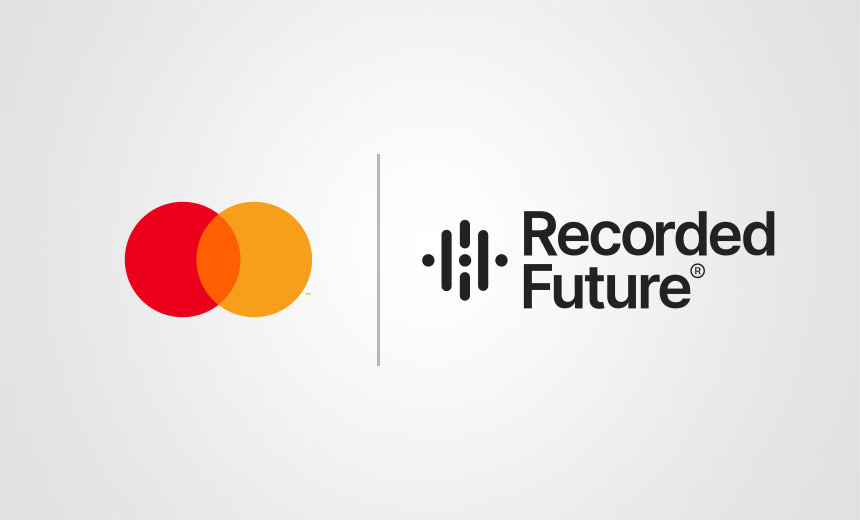Next-Generation Technologies & Secure Development
,
Threat Hunting
,
Threat Intelligence
Deal Will Help Mastercard Offer Greater Protection, Trust for Digital Transactions

Mastercard plans to purchase threat intelligence powerhouse Recorded Future for $2.65 billion to enhance cyber resilience and offer greater protection and trust around digital transactions.
See Also: Protecting Australia’s Vital Energy Grid with Stronger Security Culture
The New York-area payment card services giant said its proposed acquisition of Boston-area Recorded Future will enhance Mastercard’s identity, fraud prevention and cyber services by helping businesses proactively identify and mitigate risk. The deal is part of Mastercard’s effort to create a cyber defense strategy that aligns with the rising risk of cybercrime, which is projected to cost $9.2 trillion in 2024.
“Trust is the foundation of any relationship,” Mastercard Chief Services Officer Craig Vosburg said in a statement. “Recorded Future adds to how we deliver that greater peace of mind before, during and after the payment transaction. Together we will innovate faster, create smarter models and anticipate emerging threats before cyberattacks can take place – in payments and beyond.”
The acquisition is expected to close in the first quarter of 2025, and Mastercard’s stock is down $2.42 – or 0.5% – to $485.76 per share early Thursday. Mastercard and Recorded Future executives weren’t available for comment. The deal comes three years after Mastercard bought cryptocurrency intelligence company CipherTrace and nearly five years after purchasing third-party cyber risk firm RiskRecon.
How Mastercard, Recorded Future Fit Together
Recorded Future was founded in 2009, employs nearly 1,100 people, and has been owned since May 2019 by Insight Partners, who bought a controlling stake in the company for $780 million. The company has been led since inception by Christopher Ahlberg, who previously established and ran business intelligence company Spotfire before selling it to software behemoth TIBCO for $190 million in 2007 (see: Christopher Ahlberg on Recorded Future’s Work to Aid Ukraine).
“Fifteen years ago, we created Recorded Future with a simple goal to secure the world with intelligence,” Ahlberg said in a statement. “By joining Mastercard, we see an opportunity to help more businesses and governments determine the steps to realize their full potential – and to enable everyone to feel safer in their daily lives.”
The deal complements Mastercard’s existing services about fraud prevention and real-time decision making by integrating Recorded Future’s advanced threat intelligence capabilities, according to Vosburg. Specifically, he praised Recorded Future for being able to analyze a broad set of data sources to provide real-time insights, empowering organizations to act against risks before they escalate into major issues.
Both Mastercard and Recorded Future have invested heavily in AI technologies to prevent and detect cyberattacks, and Vosburg said combining both AI-driven threat detection systems will lead to faster innovation and smarter models for anticipating threats. He said Recorded Future’s ability to analyze vast amounts of data will significantly improve Mastercard’s fraud prevention and cybersecurity measures.
“The mission continues: Same company, new owner, massive scale,” Ahlberg wrote on LinkedIn Thursday. “Recorded Future will continue to generate intelligence at global scale, using the most advanced AI tools and methods to turn it into gold, allowing our analysts and customers to mitigate risk and protect their organizations.”
Mastercard’s Existing Bets Around Cybersecurity
Recorded Future will operate as an independent subsidiary of Mastercard, Ahlberg said, ensuring the company remains an independent and open intelligence platform. The company currently serves 1,900 clients in 75 countries, including more than 50% of the Fortune 500. Mastercard’s global influence and Recorded Future’s intelligence will allow the company to advance cybersecurity on a much larger scale.
“Threat intelligence. A critical concept for our digital world,” Mastercard CEO Michael Miebach wrote on LinkedIn Thursday. “It’s about putting the smartest minds and the best technology to work to identify the ‘what’ and ‘how’ behind potential attacks to help businesses and governments take action. Greater opportunities to protect people, their money, and the digital economy.”
Financial services and payments companies have long played in the digital fraud space, but have largely shied away from the broader cybersecurity market. One notable exception is credit ratings giant Moody’s, who became the largest shareholder in cybersecurity ratings firm Bitsight with a $250 million investment in Fall 2021.
Mastercard’s biggest play around cybersecurity to date has been focused on digital identity thanks to its $861 million acquisition of Ekata in June 2021. The company’s products focus on the identity of people, devices and transactions, and include offerings for device intelligence, behavioral biometrics, document proofing, IP intelligence, biometrics transaction fraud data, location, and payment authorization.
Recorded Future was named a leader in external threat intelligence by Forrester alongside CrowdStrike and Mandiant. The technology analyst firm praised the company for its extensive open source threat intelligence and modules designed for specific use cases and user personas, but criticized Recorded Future for a high price tag and lacking breadth and depth around its internal telemetry capabilities (see: CrowdStrike, Google, Recorded Future Lead Threat Intel Wave).
The company made three acquisitions under Insight Partners’ ownership, scooping up malware analysis startup Hatching in July 2022 to spot malware campaigns spreading across regions or industries sooner. Prior to that, Recorded Future bought attack surface monitoring provider SecurityTrails in January 2022 for $65 million as well as fraud analytics provider Gemini Advisory in March 2021 for $52 million (see: Recorded Future Buys Hatching for More Malware Visibility).
